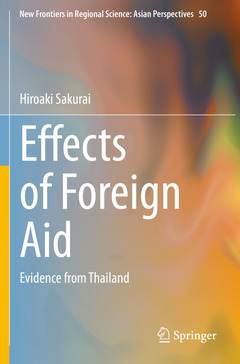Description
Effects of Foreign Aid, 1st ed. 2021
Evidence from Thailand
New Frontiers in Regional Science: Asian Perspectives Series, Vol. 50
Language: English
Subjects for Effects of Foreign Aid:
Keywords
Foreign Aid; Growth; Thailand; Development; ODA; Productivity; Fungibility
Publication date: 07-2022
82 p. · 15.5x23.5 cm · Paperback
Publication date: 07-2021
Support: Print on demand
Description
/li>Contents
/li>Biography
/li>Comment
/li>
This book focuses on the impact and effectiveness of foreign aid or official development assistance (ODA) from several aspects, as in the exemplary case of Thailand?factors that are important for formulating growth and fiscal policies to use foreign aid efficiently. Specifically, the book is devoted to analyzing the belief among aid practitioners that foreign aid, aimed mainly at wider access to social infrastructure, is one of the important elements for increasing living standards. Thailand has attained economic growth and poverty reduction while it has been receiving foreign aid for more than 50 years, with Japan providing one of the major portions of that aid. However, there is no established theory in the field of economics and related disciplines about whether foreign aid helps developing countries to improve the livelihoods of the poor. According to the analysis advocated in this book, foreign aid to Thailand contributes to economic growth. Moreover, the Thai government generally has governed foreign aid well and maintained sound management of finance primarily by reducing domestic borrowing as an alternative to foreign aid. The book shows that a kind of inter-dependent strategic relation has been established and managed well among aid agencies. These results, introduced by long-term data, are consistent with widely accepted ideas, while the effect of foreign aid itself is still under discussion. This book is intended to answer the needs of aid donors and policymakers as well as researchers and Ph.D. students. In addition, it suggests that other developing countries following similar policies should look to evidence from Thailand to reinforce their own cases.
Chapter 1. Introduction: Economic Growth and Foreign Aid in Thailand.- Chapter 2. Literature Review.- Chapter 3. Statistics in Thailand.- Chapter 4. Development Assistance and Economic Growth.- Chapter 5. Development Assistance and Fiscal Budget.- Chapter 6. Attitudes among Aid Agencies.- Chapter 7. Summary and Conclusion.
Proposes a comprehensive empirical method to measure the impact of foreign aid on economic growth
Uses applied econometric time series analysis to show the influence of foreign aid on a fiscal budget
Analyzes the relationships among major international aid agencies in the short term and long term




